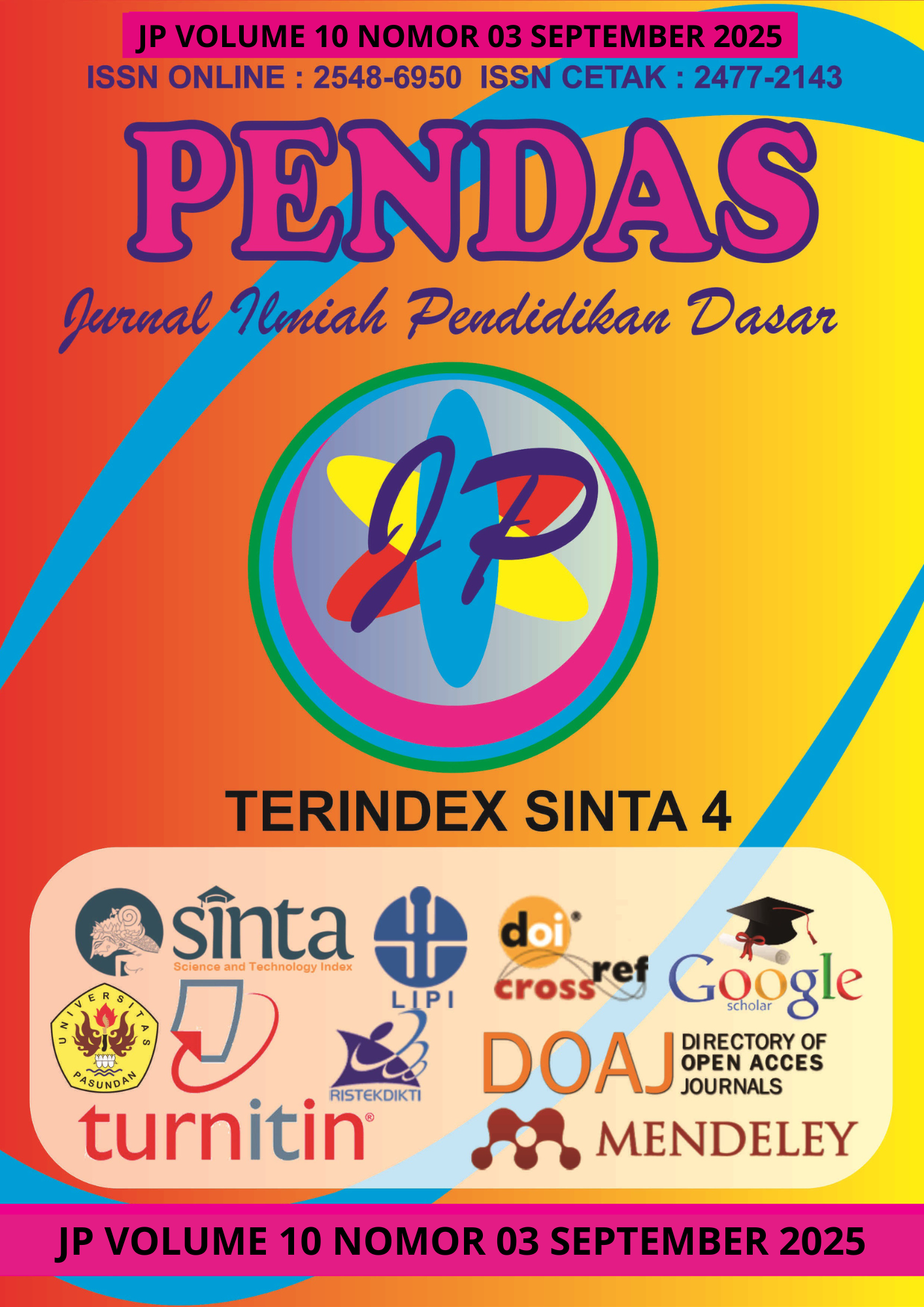PENGARUH MODEL PEMBELAJARAN PJBL (PROJECT BASED LEARNING) TERHADAP KEMAMPUAN BERPIKIR KREATIF SISWA PADA MATA PELAJARAN IPAS DI SDN RANCALABUH KABUPATEN TANGERANG
DOI:
https://doi.org/10.23969/jp.v10i03.31335Keywords:
Project-Based Learning, students, creative thinking, IPAS, SD Negeri Rancalabuh 1, Tangerang RegencyAbstract
The purpose of this study is to ascertain how much the application of project based learning (PjBL) model influences the creative thinking abilities of elementary school students, particularly in the IPAS subject. The research employed a quasi-experimental approach using the Nonequivalent Control Group Design, where two distinct groups were compared to observe the effect of the treatment given. A total of 42 fifth-grade students from SDN Rancalabuh 1 participated in the study, Split equally into two groups, class VB serves as the control group and class VA as the experimental group, with 21 students in each. The data collection instrument consisted of five essay questions that had previously been validated. The pre-test and post-test findings were analyzed using a t-test. There was no significant difference between the two groups prior to the intervention, according to the analysis, which showed that the pre-test t-value was 0.064, which was less than the t-table value of 2.021. But according to the post-test data, the t-value was 3.129, which was higher than the t-table, suggesting a significant difference following the implementation of the PjBL model. These findings indicate that the project-based approach contributes positively to improving pupils' capacity for original thought.
Downloads
References
Al Hadiq, M. F., Ramadan, G. M., & Rahayu, D. S. R. (2022). Pengaruh model Project-Based Learning terhadap kemampuan berpikir kreatif siswa SD. Jurnal Pendidikan Dasar, 5(3), 505–509.
Andiyana, M. A., Maya, R., & Hidayat, W. (2018). Analisis kemampuan berpikir kreatif matematis siswa SMP pada materi bangun ruang. Jurnal Pendidikan Matematika Indonesia, 1(3), 239–248. https://doi.org/10.22460/jpmi.v1i3.239-248
Hajaroh, S., & Raehanah. (2021). Statistik pendidikan: Teori dan praktik (E. Muliadi, Ed.). Sanabil.
Khauzanah, A. N., & Wardani, K. W. (2023). Peningkatan kemampuan berpikir kreatif berbasis literasi digital dengan model Project Based Learning pada siswa kelas V SD Negeri Secang 1. Kalam Cendekia: Jurnal Ilmiah Kependidikan, 11(3), 785–793.
Majidah, N., Maulana, A., Nooraida, D., Yanti, R., Mulyani, S., Rusda, A., ... & Pratiwi, D. A. (2024). Implementasi Kurikulum Merdeka terhadap keterampilan berpikir kreatif siswa di SDN Alalak Tengah 2. Penelitian Multidisiplin, 1226–1235.
Moma, L. (2017). Pengembangan kemampuan berpikir kreatif dan pemecahan masalah matematis mahasiswa melalui metode diskusi. Jurnal Cakrawala Pendidikan, 36(1), 130–139. https://doi.org/10.21831/cp.v36i1.10402
Raudya Tuzzahra, & Hanifah, S. M. (2019). Model Project Based Learning dan penerapannya. Jurnal Ilmu Pendidikan dan Pembelajaran, 2(1), 35–42.
Sari, R. A., & Untarti, R. (2021). Mandalika: Kemampuan berpikir kreatif matematis dan Mandalika. Journal of Education, 3, 30–39.
Sari, S. P., Manzilatusifa, U., & Handoko, S. (2019). Penerapan model Project Based Learning (PjBL) untuk meningkatkan kemampuan berpikir kreatif peserta didik. Jurnal Pendidikan Kreatif, 5(2), 119–131.
Sugiyono. (2017). Metode penelitian kuantitatif, kualitatif, dan R&D. Bandung: Alfabeta.
Suhelayanti, Syamsiah, Z., Rahmawati, I., Tantu, Y. R. P., Kunusa, W. R., Sulaeman, N., ... & Tangio, J. S. (2023). Pembelajaran Ilmu Pengetahuan Alam dan Sosial (IPAS). Makassar: Yayasan YPM Indonesia.
Taupik, R. P., & Fitria, Y. (2021). Pengaruh model pembelajaran Project Based Learning terhadap hasil belajar IPA siswa sekolah dasar. Jurnal Basicedu, 5(3), 1525–1531.
Usmadi. (2020). Pengujian persyaratan analisis (uji homogenitas dan uji normalitas). Inovasi Pendidikan, 7, 1–9.
Wahyuni, M. (2020). Statistik deskriptif untuk penelitian: Olah data manual dan SPSS versi 25 (R. Rosyid, Ed.). Bintang Pustaka Madani.
Downloads
Published
Issue
Section
License
Copyright (c) 2025 Pendas : Jurnal Ilmiah Pendidikan Dasar

This work is licensed under a Creative Commons Attribution 4.0 International License.














































